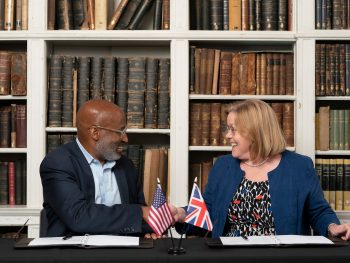US-UK research to develop and improve high-capacity batteries for EVs
A new collaboration agreement that will support joint US-UK research on high-capacity EV batteries has been signed by leaders in energy storage research.

The MOU was signed at the Royal Institution by Professor Pam Thomas of the Faraday Institution in the UK, and Dr Peter F Green from the NREL
The memorandum of understanding (MOU) between the UK’s Faraday Institution and the US Department of Energy’s (DOE’s) National Renewable Energy Laboratory (NREL) will initially look to reduce reliance on critical materials and enable recycling of lithium-ion batteries.
“An important goal is to establish a sustainable supply chain for critical materials, such as cobalt, and to establish a lithium battery recycling ecosystem to recover and reintroduce these materials into the battery supply chain. Electrochemical energy storage is one of DOE’s priorities, and collaborative activities have been established between the national laboratories in this area,” said Peter F Green, deputy laboratory director, science and technology at the NREL.
The collaboration also aims to develop and improve high-capacity batteries.
“The depth and breadth of scientific knowledge across the US National Labs and the UK’s world-leading universities is what allows for this kind of innovative partnership,” outlined Professor Pam Thomas, CEO of the Faraday Institution. “By strengthening the connections amongst the best battery research groups in the US and the UK, we will accelerate discovery and much needed breakthroughs in high-capacity cathode materials and develop recycling routes for lithium-ion batteries.
“This MOU leverages the enormous and historic strengths of the research enterprise in energy storage in both the US and the UK to accomplish this.”

